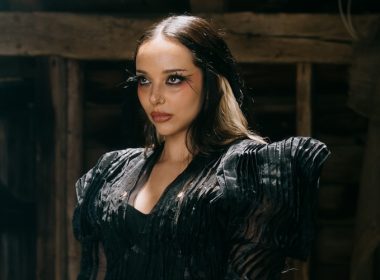In December of 2008, 19-year-old singer Diana Vickers was prematurely eliminated from the fifth season of the UK’s X Factor.
Within months after her departure however, the young singer was already creating a healthy amount of buzz around her debut–enough to nearly overshadow that of her former competitor’s efforts, Alexandra Burke and JLS.
The buzz was due to an ever-expanding rumor list of drool-worthy collaborators and musical legends, including Guy Sigsworth, Starsmith, Chris Braide, and Cathy Dennis. As the news trickled down, the promise of these recording sessions grew greater, as fans waited to hear what the quirky singer was quietly cooking up in the studio.
Then came the release of the singer’s debut single, “Once,” an instantly catchy, thrilling rush of explosive choruses and big bass beats. The single proved that Vickers’ odd, hushed delivery and near-broken vocals lent themselves perfectly to pop, causing the song to rocket to the #1 spot on the UK Singles Chart in late April of 2010. Her debut album soon followed on May 3, which also hit the #1 spot on the UK Album Chart the following week.
Songs from the Tainted Cherry Tree is incredibly solid electro-pop package, colored by an unconventionally raspy voice and a youthful spirit. Neither dance music nor torch song balladry, Vickers’ album is a refreshing blend of bright electronic hooks and classic crooning, refusing to be characterized in either direction.
With glittering, multi-layered electronica-inspired songs like “You’ll Never Get To Heaven,” “My Hip,” and “Remake Me & You,” Vickers follows in line with such artists as Ellie Goulding and Imogen Heap) in forging the somewhat newly founded genre of indie electro pop. The songs, which feature extensive production and wild, whizzing noises, mesh together to create a whimsical soundscape complimented by cheerful crooning and dizzying melodies.
“The Boy Who Murdered Love,” set to be the next single released from the album, is among one of the most immediate standouts on the record. In the song, Vickers recounts a love gone sour with the most biting of lyricism and pained delivery: “You’re the boy who murdered love,” she begins, “cold hands and a heart of stone. You’re a Midas in reverse, you’re the king of pain and hurt.” Everything about the song burns with broken-hearted anguish, resulting in one of the most delicious of the electro-pop confections on the record.
“My Hip,” which features Vickers herself taking a turn on the trumpet, is another highlight. Taking a break from the lush, ethereal electronic sounds for a brief foray through frantic, skipping beats and trumpet flares, the singer charms her way through a gleeful crush. It’s both adorable and addictive.
Vickers’ only cover on the album is also a delightful surprise for music fans, The Sugarcubes‘ song, “Hit.” Vickers’ version blends in effortlessly with the rest of the record, replacing the groovier original beats with bright, poppy synthesizers and swirling electronic beats. As it (unsurprisingly) turns out, the singer’s voice takes well to Björk‘s throaty yelps, making it sound more like an original selection than a mere karaoke attempt.
The ballads, however, are a bit more temperamental than the uptempo offerings. “Four Leaf Clover,” for instance, is an overly soggy misstep that, aside from the song’s lonesome verses, never fully redeems itself from a rather cliched chorus. The same applies to “Me & You.”
It is only with “N.U.M.B.” and “Notice,” two incredibly sophisticated slices of adult pop, that Vickers truly raises the bar for the rest of the album and firmly establishes herself as more than just a pretty voice. The proof comes three and a half minutes into “N.U.M.B.”, as Vickers tackles the final repetition of the chorus expert delivery, emitting a soaring, heartbreaking final note that comes crashing down. Chills.
Vickers’ debut is far more exciting and listenable than most of what’s come out of the X Factor/Simon Cowell hit machine as of late. Songs from the Tainted Cherry Tree is a highly listenable, engaging album of lush electronica that proves why Vickers is much, much more than simply a finalist on some reality show.




